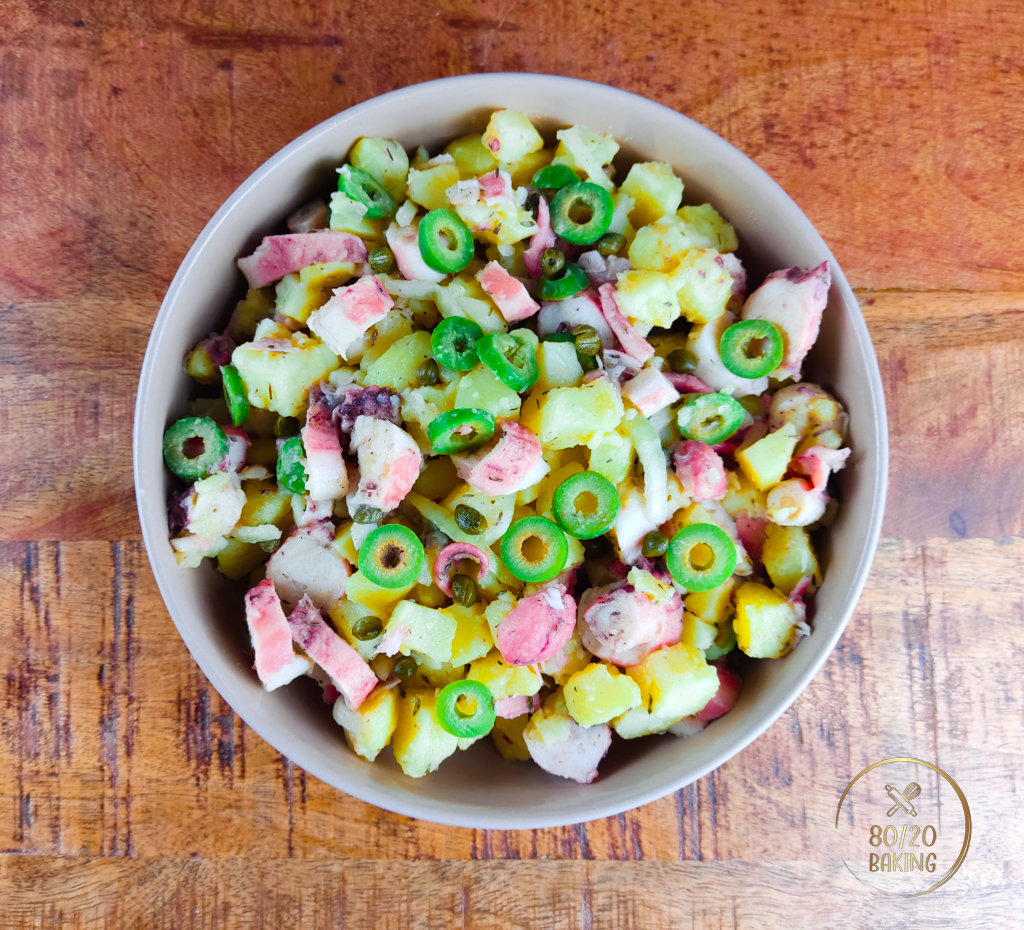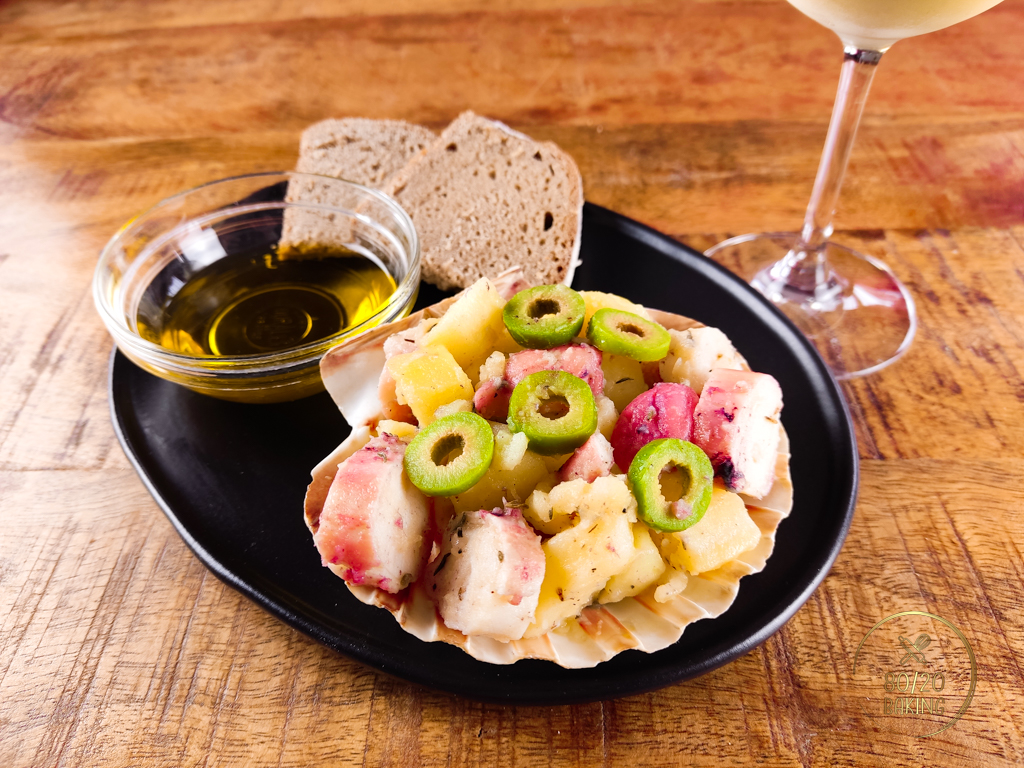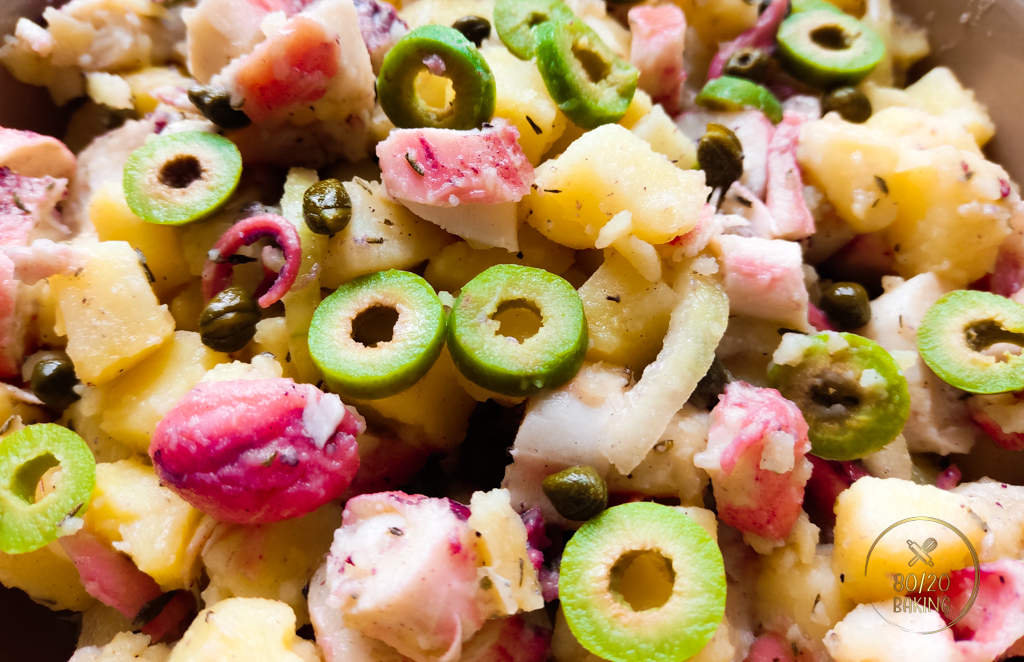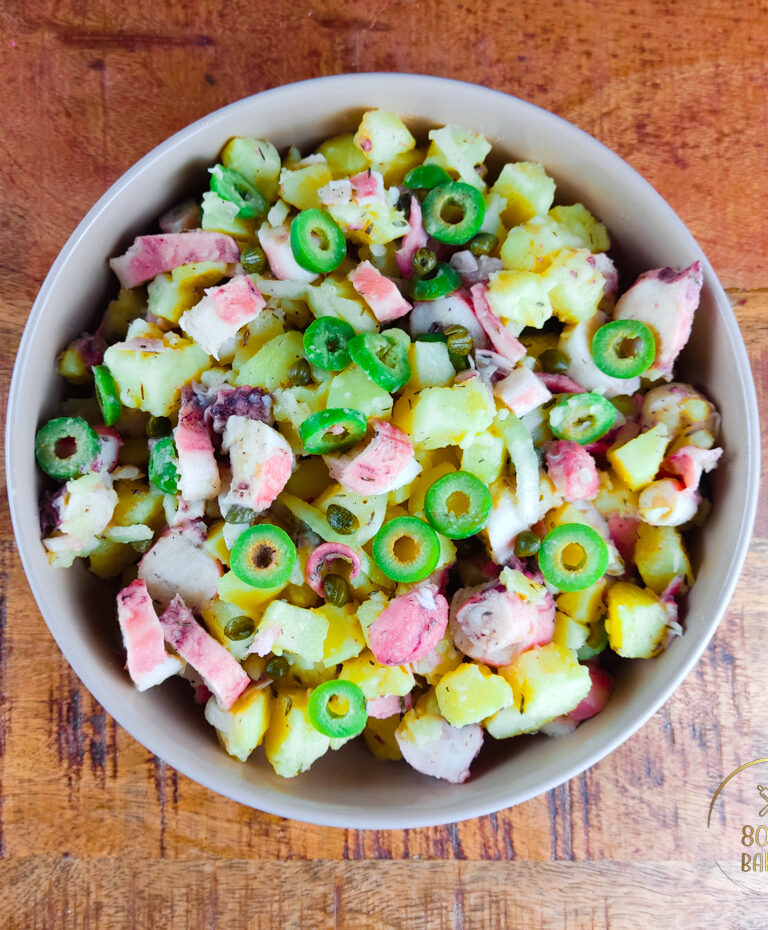This potato octopus salad is a perfect combination of tender octopus, creamy potatoes, and the fresh flavors of parsley, onions, olives, and olive oil. Enjoy this delightful seafood salad as a light and satisfying dish that is sure to impress your guests.

Why You´ll Love This Potato Octopus Salad:
- it is easy to make
- it is delicious
- it is healthy and high in protein
- it is not your boring everyday salad
- you can eat it as an appetizer, main dish or side dish
Octopus salad is a delightful and refreshing dish that showcases the unique flavors and textures of this ocean-dwelling creature. With its tender yet slightly chewy texture and mild seafood taste, octopus makes for a perfect ingredient in a salad that is both light and satisfying.
The beauty of potato octopus salad lies in its versatility. You can serve it as a light appetizer, a refreshing side dish, or even as a main course for a satisfying meal. This salad is not only delicious but also a healthy option. Octopus is a good source of protein, low in fat, and rich in vitamins and minerals.
History of Octopus Salad
Octopus salad has a rich history rooted in Mediterranean cuisine. Originating from coastal regions, especially in Greece, Italy, and Spain, the dish has been enjoyed for centuries. The utilization of fresh seafood, including octopus, in Mediterranean cooking can be traced back to ancient times. At the time coastal communities relied heavily on the bounty of the sea for sustenance. Over time, octopus salad has evolved into a beloved culinary tradition. To this day it is celebrated for its unique flavors and cultural significance in the Mediterranean diet. Today, it continues to be a popular dish, appreciated for its refreshing taste and historical ties to coastal living.
Octopus salad comes in so many yummy varieties, each offering a unique blend of flavors and textures. You’ve got your Mediterranean octopus salad with olives, tomatoes, and feta cheese, the Japanese octopus salad with seaweed and soy sauce, and the Spanish octopus salad with paprika and roasted peppers. These salads showcase the versatility of octopus as an ingredient. They also provide a delightful dining experience with their diverse cultural influences. Today we are making a less known Croatian octopus salad with potatoes.

What Makes Octopus so Healthy?
Octopus is not only a delicious seafood delicacy, but it also offers several health benefits. Here are some of the health benefits of consuming octopus:
- High in Protein: Octopus is a great source of lean protein, which is essential for muscle growth, repair, and overall good health. A 100 g serving of octopus provides a significant amount of protein. That makes it an excellent choice for individuals looking to increase their protein intake.
- Low in Fat: Octopus is low in fat, particularly saturated fat, making it a heart-healthy protein option. Consuming foods low in saturated fat can contribute to maintaining healthy cholesterol levels and reducing the risk of heart disease.
- Rich in Vitamins and Minerals: Octopus is a good source of essential vitamins and minerals, including vitamin B12, vitamin E, vitamin C, and minerals such as iron, zinc, and copper. These nutrients play important roles in supporting the immune system, promoting healthy skin, aiding in the production of red blood cells, and contributing to overall well-being.
- Omega-3 Fatty Acids: Octopus contains omega-3 fatty acids. They are known for their anti-inflammatory properties and their benefits for heart and brain health. Consuming foods rich in omega-3 fatty acids may help reduce the risk of cardiovascular disease and support cognitive function.
- Low Calorie Content: Octopus is relatively low in calories, which makes it a good option for individuals who are mindful of their calorie intake. Those looking to manage their weight can enjoy this delicious and nutritious protein source, without any guilt.
- Source of Taurine: Taurine is an amino acid that plays a role in various physiological functions, including supporting cardiovascular health and eye health. Octopus is a natural source of taurine, providing this beneficial compound to the diet.
It’s important to note that while octopus offers these health benefits, it’s also crucial to ensure that you prepare it in a safe and sustainable manner. When consumed as part of a balanced diet, octopus can be a nutritious addition to a healthy lifestyle.

What Makes Frozen Octopus a Better Choice Than a Fresh One?
Using frozen octopus can be advantageous for several reasons. First, freezing octopus helps to kill any parasites or bacteria that may be present in the seafood, ensuring that it is safe to consume. Additionally, freezing the octopus can help to break down the tough muscle fibers. That will result in a more tender and palatable texture when it is cooked. Furthermore, frozen octopus is often more readily available. You can also store it for longer periods, which results in a greater flexibility in meal planning. Lastly, using frozen octopus can be more cost-effective than purchasing fresh octopus, which is usually a big plus for home cooks and culinary enthusiasts.
What You´ll Need to Prepare This Potato Octopus Salad
To prepare this delicious potato octopus salad, you will need the following ingredients:
- 1 kg of frozen octopus tentacles
- 1 kg of potatoes
- 1 small onion, finely chopped
- 50 g of pitted olives, sliced
- 1 tablespoon of capers
- some chopped parsley
- 50 ml of extra virgin olive oil
- 50 ml of vinegar or lemon juice
How to Prepare This Salad?
- Boil the octopus tentacles, until they become tender. Boil the potatoes.
- In a large bowl, combine the boiled octopus cut in pieces, diced potatoes, chopped parsley, sliced olives, sliced onion, and some capers.
- In a separate small bowl, whisk together the extra virgin olive oil, lemon juice or white wine vinegar, salt, and black pepper to create the dressing.
- Pour the dressing over the rest of the ingredients, and gently toss the ingredients until they are well coated with the dressing.
- Adjust the seasoning with additional salt and pepper to taste, if needed.
- Cover the bowl with plastic wrap and refrigerate the potato octopus salad for at least 30 minutes to allow the flavors to meld together.
- Once chilled, give the salad a final gentle toss before serving.
- Serve the potato octopus salad as a refreshing and flavorful appetizer or side dish, garnished with a sprig of fresh parsley for an added touch of color.
If you are looking for some other salad ideas, make sure you try my Zucchini Carrot Salad.

Potato Octopus Salad
Ingredients
Instructions
-
-
- Boil the octopus tentacles, until they become tender. Boil the potatoes.
-
- In a large bowl, combine the boiled octopus cut in pieces, diced potatoes, chopped parsley, sliced olives, sliced onion, and some capers.
-
- In a separate small bowl, whisk together the extra virgin olive oil, lemon juice or white wine vinegar, salt, and black pepper to create the dressing.
-
- Pour the dressing over the rest of the ingredients, and gently toss the ingredients until they are well coated with the dressing.
-
- Adjust the seasoning with additional salt and pepper to taste, if needed.
-
- Cover the bowl with plastic wrap and refrigerate the potato octopus salad for at least 30 minutes to allow the flavors to meld together.
-
- Once chilled, give the salad a final gentle toss before serving.
-
- Serve the potato octopus salad as a refreshing and flavorful appetizer or side dish, garnished with a sprig of fresh parsley for an added touch of color.
-


